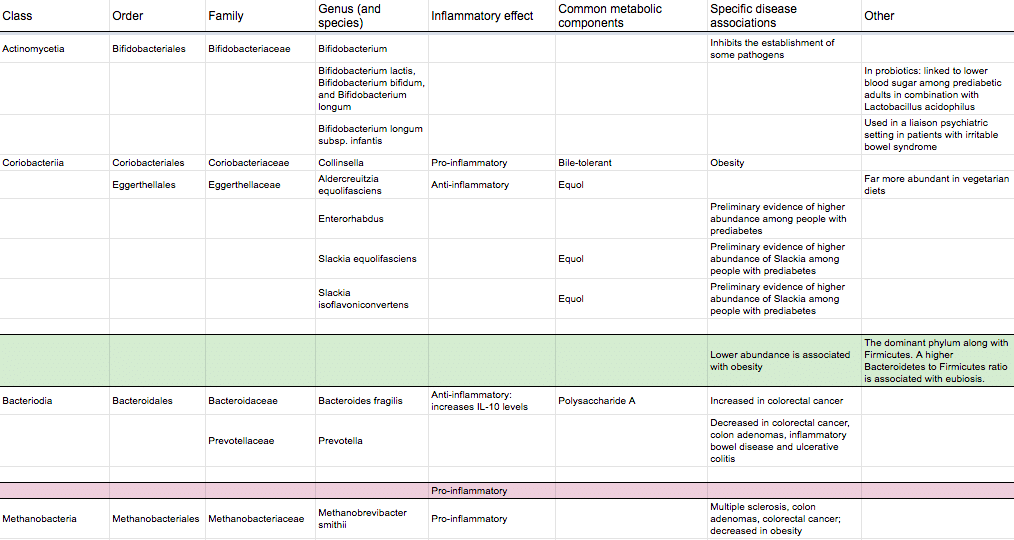Are you a health professional?
Microbes: summary of effects
We created a spreadsheet of many phyla, classes, and species of bacteria and some of their effects on health and metabolism. We find it helpful in interpreting studies that we review, and we share it for those who are interested:

Modes of action
Acetate is the principal short chain fatty acid in the colon, and after absorption it has been shown to increase cholesterol synthesis. However, propionate, a gluconeogenerator, has been shown to inhibit cholesterol synthesis. Therefore, substrates that can decrease the acetate: propionate ratio may reduce serum lipids and possibly cardiovascular disease risk. Butyrate has been studied for its role in nourishing the colonic mucosa and in the prevention of cancer of the colon.1Wong JM, de Souza R, Kendall CW, Emam A, Jenkins DJ. Colonic health: fermentation and short chain fatty acids. Journal of Clinical Gastroenterology. 2006 Mar;40(3):235-43.
Preclinical evidence
Notable preclinical evidence is presented here; clinical evidence is summarized in Why is your microbiome important? ›
Improving treatment outcomes
Breast cancer
Higher frequency and pro-fibrogenicity of mast cells in normal, non-tumor-bearing mammary tissues from dysbiotic animals compared to other animals in a preclinical study, plus a positive correlation between enhanced collagen levels in tumor-adjacent mammary tissue samples and mast cell abundance and cancer recurrence among people with HR+ breast cancer2Feng TY, Azar FN et al. Reciprocal interactions between the gut microbiome and mammary tissue mast cells promote metastatic dissemination of HR+ breast tumors. Cancer Immunology Research. 2022 Aug 30:CIR-21-1120.
Pancreatic cancer
Altering the pancreatic microbiome, such as through ablation, can slow disease progression in mice.3Castellino AM. Pancreatic microbiome influences cancer and its treatment. Medscape. March 23, 2018. Viewed April 15, 2018; Pushalkar S, Hundeyin M et al. The pancreatic cancer microbiome promotes oncogenesis by induction of innate and adaptive immune suppression. Cancer Discovery. 2018 Apr;8(4):403-416.
Managing side effects
Cachexia
Gut microbiota play a prominent role in cancer cachexia in preclinical studiestesting a drug, a procedure, or another medical treatment in isolated cells or in animals; preclinical evidence is considered only an initial indication of possible effects in people.4Ziemons J, Smidt ML, Damink SO, Rensen SS. Gut microbiota and metabolic aspects of cancer cachexia. Best Practice & Research Clinical Endocrinology & Metabolism. 2021 May;35(3):101508.
Liver regeneration
Improved phospholipid biosynthesis, hepatocyte proliferation, liver regeneration and survival after partial hepatectomy in gnotobiotic mice colonized with a minimal SCFA-producing microbial community compared to controls5Yin Y, Sichler A et al. Gut microbiota promote liver regeneration through hepatic membrane phospholipid biosynthesis. Journal of Hepatology. 2023 Jan 18:S0168-8278(23)00009-0.
Helpful links for professionals
With gratitude to Julie M. Deleemans, MSc, PhD, for her contributions
Conventional treatment interactions with the microbiome
- Boesch M, Horvath L et al. Compartmentalization of the host microbiome: how tumor microbiota shapes checkpoint immunotherapy outcome and offers therapeutic prospects. Journal of Immunotherapy of Cancer. 2022 Nov;10(11):e005401.
- Al-Qadami GH, Secombe KR, Subramaniam CB, Wardill HR, Bowen JM. Gut microbiota-derived short-chain fatty acids: impact on cancer treatment response and toxicities. Microorganisms. 2022 Oct 17;10(10):2048.
Cancer-specific resources
- Vivarelli S, Salemi R et al. Gut microbiota and cancer: from pathogenesis to therapy. Cancers (Basel). 2019 Jan 3;11(1):38.
- Zitvogel L, Pietrocola F, Kroemer G. Nutrition, inflammation and cancer. Nature Immunology. 2017 Jul 19;18(8):843-850.
- Kelly DL, Lyon DE, Yoon SL, Horgas AL. The microbiome and cancer: implications for oncology nursing science. Cancer Nursing. 2016 May-Jun;39(3):E56-62.
- Key TJ, Bradbury KE et al. Diet, nutrition, and cancer risk: what do we know and what is the way forward? British Medical Journal. 2020 Mar 5;368:m511.
- Hullar MA, Burnett-Hartman AN, Lampe. Gut microbes, diet, and cancer. Cancer Treatment and Research, 31 Dec 2013, 159:377-399.
- Bultman SJ. Emerging roles of the microbiome in cancer. Carcinogenesis. 2014;35(2):249–255.
- Vogtmann E, Goedert JJ. Epidemiologic studies of the human microbiome and cancer. British Journal of Cancer. 2016 Feb 2;114(3):237-42.
- Goodman B, Gardner H. The microbiome and cancer. The Journal of Pathology. 2018 Apr;244(5):667-676.
- Fulbright LE, Ellermann M, Arthur JC. The microbiome and the hallmarks of cancer. PLOS/Pathology. 2017 Sep 21;13(9):e1006480.
- Kaczor T. The human microbiome in cancer: a mini-review of microbiome optimization in integrative oncology. Natural Medicine Journal. 2017 Nov;9(111);sup 20-7.
- Garrett WS. Cancer and the microbiota. Science. 2015 Apr 3;348(6230):80-6.
- Rajagopala SV, Vashee S et al. The human microbiome and cancer. Cancer Prevention Research (Philadelphia). 2017 Apr;10(4):226-234.
Managing side effects of cancer treatments
- Darbandi A, Mirshekar M et al. The effects of probiotics on reducing the colorectal cancer surgery complications: a periodic review during 2007-2017. Clinical Nutrition. 2020 Aug;39(8):2358-2367.
- Jordan KR, Loman BR, Bailey MT, Pyter LM. Gut microbiota-immune-brain interactions in chemotherapy-associated behavioral comorbidities. Cancer. 2018 Oct 15;124(20):3990-3999.
- Bajic JE, Johnston IN, Howarth GS, Hutchinson MR. From the bottom-up: chemotherapy and gut-brain axis dysregulation. Frontiers in Behavioral Neuroscience. 2018 May 22;12:104.
- Prisciandaro LD, Geier MS, Butler RN, Cummins AG, Howarth GS. Evidence supporting the use of probiotics for the prevention and treatment of chemotherapy-induced intestinal mucositis. Critical Reviews in Food Science and Nutrition. 2011 Mar;51(3):239-47.
General resources on the microbiome
- Dinan TG, Cryan JF. The microbiome-gut-brain axis in health and disease. Gastroenterology Clinics of North America. 2017 Mar;46(1):77-89.
- de Vrese M, Schrezenmeir J. Probiotics, prebiotics, and synbiotics. Advances in Biochemical Engineering/Biotechnology . 2008;111:1-66.
- Park RX America: For Health Professionals—guidance on prescribing nature as part of health care
- Lee CJ, Sears CL, Maruthur N. Gut microbiome and its role in obesity and insulin resistance. Annals of the New York Academy of Sciences. 2020 Feb;1461(1):37-52.
- Cheng M, Ning K. Stereotypes about enterotype: the old and new ideas. Genomics, Proteomics & Bioinformatics. 2019 Feb;17(1):4-12.
References
